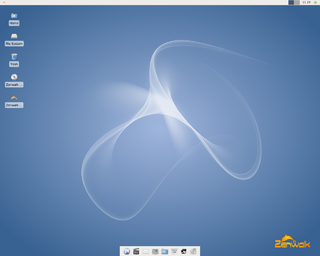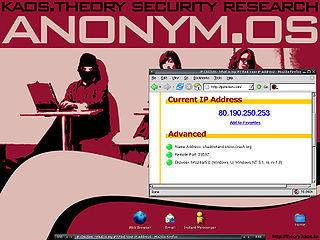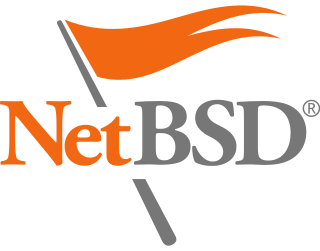
Mandriva Linux is a discontinued Linux distribution developed by Mandriva S.A.

Gentoo Linux is a Linux distribution built using the Portage package management system. Unlike a binary software distribution, the source code is compiled locally according to the user's preferences and is often optimized for the specific type of computer. Precompiled binaries are available for some packages. Gentoo runs on a wide variety of processor architectures. For the full list see table on the right.

Xandros, Inc. was a software company which sold Xandros Desktop, a Linux distribution. The name Xandros was derived from the X Window System and the Greek island of Andros. Xandros was founded in May 2001 by Linux Global Partners. The company was headquartered in New York City with its development office in Ottawa, Canada.

Portage is a package management system originally created for and used by Gentoo Linux and also by ChromeOS, Calculate, Sabayon, and Funtoo Linux among others. Portage is based on the concept of ports collections. Gentoo is sometimes referred to as a meta-distribution due to the extreme flexibility of Portage, which makes it operating-system-independent. The Gentoo/Alt project was concerned with using Portage to manage other operating systems, such as BSDs, macOS and Solaris. The most notable of these implementations is the Gentoo/FreeBSD project.
Puppy Linux is a family of light-weight Linux distributions that focus on ease of use and minimal memory footprint. The entire system can be run from random-access memory (RAM) with current versions generally taking up about 600 MB (64-bit), 300 MB (32-bit), allowing the boot medium to be removed after the operating system has started. Applications such as AbiWord, Gnumeric and MPlayer are included, along with a choice of lightweight web browsers and a utility for downloading other packages. The distribution was originally developed by Barry Kauler and other members of the community, until Kauler retired in 2013. The tool Woof can build a Puppy Linux distribution from the binary packages of other Linux distributions.

TrueOS is a discontinued Unix-like, server-oriented operating system built upon the most recent releases of FreeBSD-CURRENT.

Zenwalk GNU/Linux is a desktop-focused Linux distribution founded by Jean-Philippe Guillemin. It is based on Slackware with very few modifications at system level making it 100% compatible with Slackware. It aims to be a modern, multi-purpose Linux distribution by focusing on internet applications, multimedia and programming tools. It comes with many specialized tools and is designed for beginners and advanced users alike, as it offers system configuration via both graphical tools and the command line.

Anonym.OS was a Live CD operating system based on OpenBSD 3.8 with strong encryption and anonymization tools. The goal of the project was to provide secure, anonymous web browsing access to everyday users. The operating system was OpenBSD 3.8, although many packages have been added to facilitate its goal. It used Fluxbox as its window manager.
There are a number of Unix-like operating systems based on or descended from the Berkeley Software Distribution (BSD) series of Unix variant options. The three most notable descendants in current use are FreeBSD, OpenBSD, and NetBSD, which are all derived from 386BSD and 4.4BSD-Lite, by various routes. Both NetBSD and FreeBSD started life in 1993, initially derived from 386BSD, but in 1994 migrated to a 4.4BSD-Lite code base. OpenBSD was forked from NetBSD in 1995. Other notable derivatives include DragonFly BSD, which was forked from FreeBSD 4.8.

gNewSense was a Linux distribution, active from 2006 to 2016. It was based on Debian, and developed with sponsorship from the Free Software Foundation. Its goal was user-friendliness, but with all proprietary and non-free software removed. The Free Software Foundation considered gNewSense to be composed entirely of free software.

FreeBSD is a free and open-source Unix-like operating system descended from the Berkeley Software Distribution (BSD). The first version of FreeBSD was released in 1993 developed from 386BSD and the current version runs on x86, ARM, PowerPC and RISC-V processors. The project is supported and promoted by the FreeBSD Foundation.
GNU variants are operating systems based upon the GNU operating system. According to the GNU project and others, these also include most operating systems using the Linux kernel and a few others using BSD-based kernels.

MidnightBSD is a free Unix, desktop-oriented operating system originally forked from FreeBSD 6.1, and periodically updated with code and drivers from later FreeBSD releases. Its default desktop environment, Xfce, is a lightweight user friendly desktop experience.

Calculate Linux is a Linux distribution optimized for fast deployment in an organization environment. It is based on the Gentoo Linux project and includes many preconfigured functions.

GhostBSD is a Unix-like operating system based on FreeBSD, with MATE as its default desktop environment and an Xfce-desktop community based edition. It aims to be easy to install, ready-to-use and easy to use. The project goal is to combine security, privacy, stability, usability, openness, freedom and to be free of charge.

NetBSD is a free and open-source Unix-like operating system based on the Berkeley Software Distribution (BSD). It was the first open-source BSD descendant officially released after 386BSD was forked. It continues to be actively developed and is available for many platforms, including servers, desktops, handheld devices, and embedded systems.

Mageia is a Linux-based operating system, distributed as free and open-source software. It was forked from the Mandriva Linux distribution. The Greek term mageía (μαγεία) means enchantment, fascination, glamour, wizardry.














